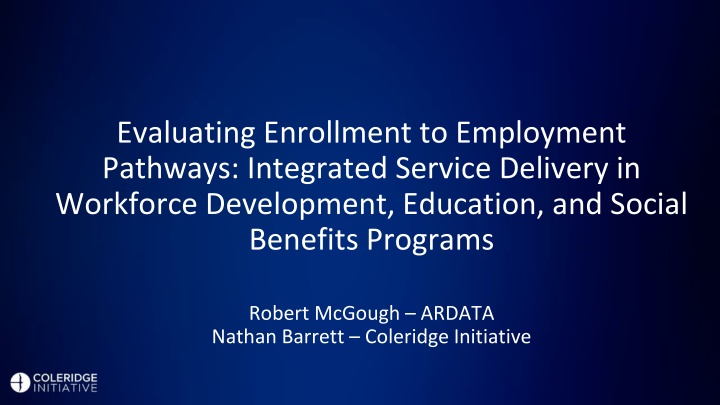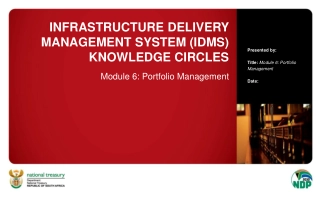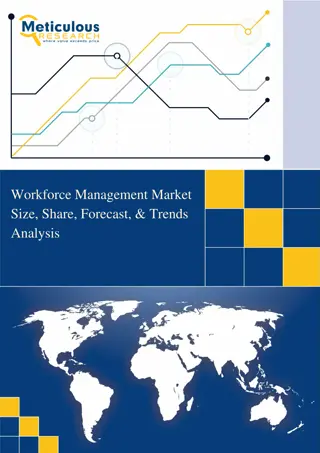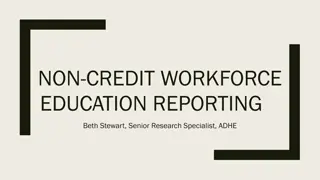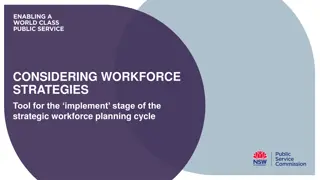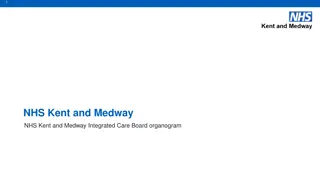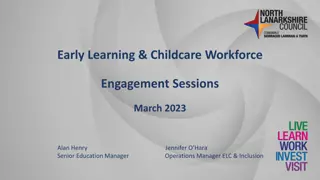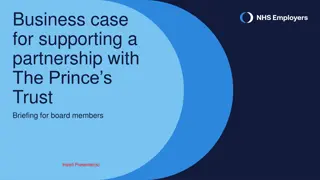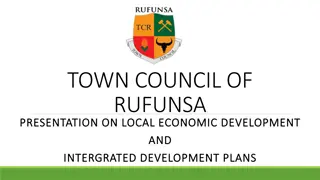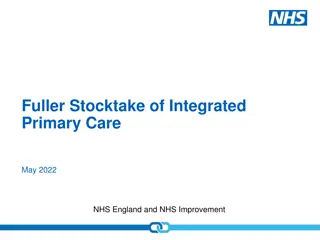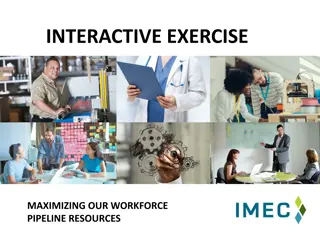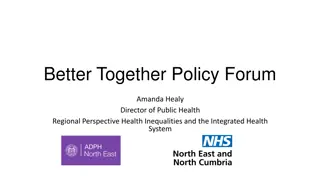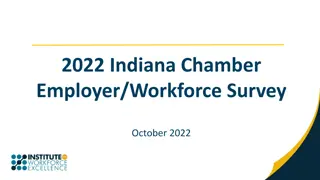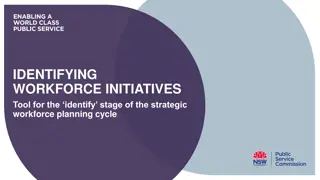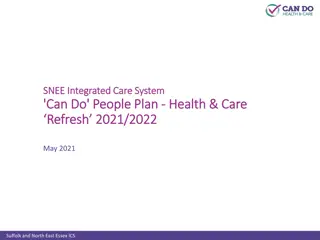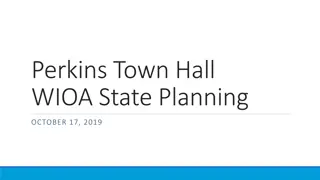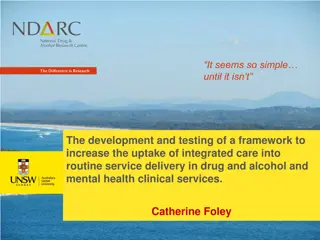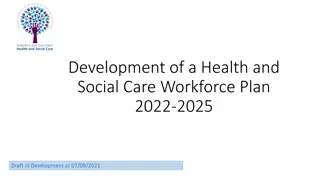Integrated Service Delivery in Workforce Development
Evaluating Enrollment to Employment Pathways explores the integrated service delivery in workforce development, education, and social benefits programs. It emphasizes the necessary conditions and foundational work required for driving insights from data, focusing on policy questions, cross-state mobility, and multiple services. The platform, training, and products are essential components for building capacity and leveraging data infrastructure effectively. The ADRF provides a secure cloud-based environment supporting evidence development for policy and programs under the Five Safes Framework.
Download Presentation

Please find below an Image/Link to download the presentation.
The content on the website is provided AS IS for your information and personal use only. It may not be sold, licensed, or shared on other websites without obtaining consent from the author.If you encounter any issues during the download, it is possible that the publisher has removed the file from their server.
You are allowed to download the files provided on this website for personal or commercial use, subject to the condition that they are used lawfully. All files are the property of their respective owners.
The content on the website is provided AS IS for your information and personal use only. It may not be sold, licensed, or shared on other websites without obtaining consent from the author.
E N D
Presentation Transcript
Evaluating Enrollment to Employment Pathways: Integrated Service Delivery in Workforce Development, Education, and Social Benefits Programs Robert McGough ARDATA Nathan Barrett Coleridge Initiative
Precursor to Driving Insights from Data What questions can t you answer with the data and infrastructure you have available to you? Necessary conditions The platform, training, and products are necessary to driving insights from data, but on their own insufficient Assumes that data sharing agreements are in place that authorize the connection and use of different data systems This is nontrivial work that is foundational to everything that follows
Driving Insights from Data What questions can t you answer with the data and infrastructure you have available to you? Policy questions can be increasingly complex and require robust data infrastructure Cross-state mobility Accounting for multiple services Necessary conditions Platform Host data from disparate sources while retaining data stewardship oversight Provide access for approved use cases and users Training Building capacity to understand and leverage the infrastructure technical and applied Provides a place for R&D Products and Practice Institutionalizing the use of the data infrastructures through products and their use
ADRF Secure cloud-based data and computing environment that supports agencies and researchers in the development of evidence for policy and programs. FedRAMP Authorized Customizable configurations to meet various agency and researcher needs Operates under the five-safes framework
Five Safes Framework Safe Projects Safe People Safe Settings Safe Data Safe Exports Trained and Authorized Researchers Only approved researchers are permitted to access project workspaces User on-boarding process includes signing data use agreements, terms of use, security training module Data resources are explicitly granted based on project requirements Data resources are strictly in a read-only mode to ensure the integrity of the source data Security protocols follow strict FedRAMP guidelines Non-Disclosive Exports Prevents users from unauthorized removal of any information within the secure environment Export requests are reviewed by data stewards following agency guidelines (e.g. proper cell suppression, no complementary disclosures, rounding and noise applied, no references to disclosive specific observations) Maintain a log of export requests for auditing purposes and to evaluate subsequent requests for complementary disclosure Prevents Unauthorized Use Provides secure methods for agency micro-data transfer Only agency authorized personnel are invited to perform data transfers The transfer of data uses the FedRAMP Authorized, FIPS 140-2 validated, Kiteworks Secure Environment The transfer of data is restricted to upload operations only Additional security protocols include vulnerability scanning and third-party penetration testing Protect Data Confidentiality Data Hashing - A custom stand-alone application simplifies and facilitates the hashing of data prior to transmission to the ADRF Data Stewardship - a web- based portal for data stewards to manage and monitor project and associated resources including project configurations, user activity, user onboarding status, and overall cost of a project on the ADRF etc. Appropriate Use of Data Only agency approved projects and data sets Only approved members can access the isolated project workspaces Controlled access to resources No shared environment between projects and resources
Trainings to Date 36 trainings 1000+ participants 340+ organizations 40+ states
The Approach Development Work with agency partner to establish the research question and required data Project template Build coding notebooks Syllabus and lectures Delivery Combination of lectures and facilitated team breakouts Foundations Coding principles Module 1 Data preparation and exploration Module 2 Analytics Final presentation
Core Principles Every class is bespoke Topics best learned through a hands-on approach with actual micro- level administrative data Data science is a team sport Multiple agencies and skills represented Project-based - Teams develop their own research topic within the scope of the class Not a dissertation but the work must provide the foundation for something that is timely, relevant, and actionable The training can always be improved
The Approach Products should be thought of broadly Anything that improves the construction and use of data infrastructure and/or enhances the ability to communicate evidence to a broad community of stakeholders. Principles Must be developed in partnership Timely, actionable, relevant Intentionally iterative Scalable Accessible Stakeholders must be aware they exist
Data Dashboards Training classes have led to dozens of promising opportunities integrated across data systems Formalizing these opportunities can facilitate Quickly reproducible code bases Consistency and scalability Tiered Access Overlays Digital twin
What Does This Look Like in Practice? Every state has a different starting point, and there are multiple on ramps and ways to benefit Sharing data is not a requirement for participation and can happen when feasible and valuable for each state Options can include attending training programs, participating in the Multistate Data Collaborative community of practice and working groups, adopting products, facilitating in-state data sharing and use, multistate and cross-sector data sharing, or even developing your own programs based on state priorities.
Arkansas Journey: Motivating Drivers 2019 legislation charged the Arkansas Data Office (ARData) with development of an SLDS to develop an improved understanding of outcomes, identify opportunities for improvement, and align programs and resources with evolving needs
Arkansas Journey: Initial Interest The Arkansas team first learned of the ADRF at the 2019 SHEEO data convening and added it to our takeaways and action steps
Arkansas Journey: Exploration and Learning To learn best practices from other states and explore the ADRF as an option, Arkansas participated in several training programs hosted by other states and organizations, all of which benefited AR in practice: Transitions in Education and Work (OH 2020) Developed nursing pathway study approach in use today Unemployment to Reemployment (ETA/IL 2021) Developed workforce dashboard being deployed today Transitions in Education and Work (TN 2021) Developed higher education student migration model used today Leveraging Big Data to Achieve Equity (UNCF/Excelencia 2021) Informed approaches used by a statewide workforce equity study Value Data Collaborative (IHEP 2022) Provided valuable learnings for credentials of value measurement
Arkansas Journey: Participation Arkansas first participation in sharing data through the ADRF started in 2021, as a key component of our new architecture under the Workforce Data Quality Initiative (followed by JRI, IES SLDS, and Medicaid)
Arkansas Journey: Contribution In 2022, Arkansas worked with the Coleridge Initiative to develop a new Applied Data Analytics training program focused on work-based learning to support state initiatives to scale and align WBL in Arkansas. Five teams from AR, MO, and CA completed projects leading to valuable insights and products: From Trained to Retained: An Analysis of Retention Outcomes for RAP Completers Apprenticeship Experience of Justice-Involved Individuals in Arkansas: Barriers to Success Retention Trends Within Arkansas WBL-to-Workforce Pipeline Registered Apprenticeship Programs: Does Completion Matter? Work-Based Learning: What is the Current Reality in Arkansas?
Arkansas Journey: Sharing In 2022, Arkansas switched from sending data files out to researchers to bringing researchers to the data in the Arkansas ADRF environment. This has made the process of facilitating secure researcher access to data more efficient for everyone involved, facilitated improved monitoring and control over access, use, and disclosure, and reduced the risk of sharing. With over 70 Arkansas government staff trained in evaluation and research in the ADRF, this also facilitates more efficient state capacity. By leveraging an ever-expanding linked longitudinal data set, models, methods, and expertise (more than just data), the deltas continue to shrink and we are achieving accelerating velocity from question to insight with repeatable shared service products for common needs.
Enrollment to Employment (E2E) In 2023, Arkansas worked with the Coleridge Initiative to develop an Applied Data Analytics training program on Evaluating Enrollment to Employment Outcomes (E2E). The program is designed to facilitate evaluation, research, and product development related to integrated service delivery (ISD) across education,workforce development (WIOA), WBL (RAPS), and social benefit (SNAP, TANF) programs. The program is being delivered over 5 cohorts of 30 students each representing over 40 states. 2 are provided via AR WDQI. 3 are supported by DOL ETA and NASWA.
E2E Interagency Data Sharing Development of the data sharing agreements for the program facilitated some new sharing of Arkansas data across numerous department and programs that is providing benefits beyond facilitating the program and related projects.
E2E Interstate and Cross-Sector Data Sharing The E2E program (like many ADA programs before it) is bringing value to participants from other states and sectors by facilitating secure access to real administrative data and subject matter expertise across a wide breadth of programs, facilitating some analyses not previously possible. Knowledge sharing often continues after the program through a growing community of practice. The curriculum itself did not start from scratch and resulted from years of successive collaborative development, improvement, and sharing of an evolving curriculum library that has been delivered to (and improved by) over 1K participants.
E2E Sharing of Value The E2E teams are producing data products with actionable value to states which are collaboratively developed, shared, and scaled. The multi-state and cross sector teams and cohorts are rapidly expanding the body of knowledge on and across these administrative data sets that are leading to data quality improvements and potential enhancements to data collection mechanisms and interoperable record formats. The curriculum s focus on integrated service delivery (programs sharing data/referrals and working together) itself is facilitating evaluation and research on the degrees of sharing and integration across programs and potential impacts of increased sharing and integration at the operational level on resident outcomes.
E2E Projects The E2E teams are producing data products with actionable value to states which are collaboratively developed, shared, and scaled. Class 1: Effectiveness of Adult Education Programs on Workforce Outcomes Resulted in development of a Title II PIRL mapping Stayers, Stutterers, and Leavers SNAP churn analysis now supporting broader SNAP evaluation and research efforts Your Arkansas Pathway Interactive analysis of the multi-step pathways taken by participants and related outcomes Class 2: Role of Demographics on Apprenticeship Completion Status (DC) Job Quality Outcomes from Enrollment in WIOA Youth and Adult Programs (DE, MA) Efficacy of Single Enrollment vs Co-Enrollment on Job Quality Improvement (MO) Employment Outcomes of Welfare Recipients in Arkansas (NJ) The Effects of WIOA Title I Services in the SNAP Population of ABAWDS (OH) Factors Influencing Apprenticeship Completion and Subsequent Earnings (CT)
Whats Next? Data Infrastructure Building a foundation for a Multi State K-12 through education and workforce data system Correctional Education Opportunities and workforce outcomes Upcoming Training Opportunities Prison Education Programs Value-Data Framework Education and Workforce Indicator Framework K-12 through education and workforce Short Courses
Call to Action Register for Coleridge s upcoming convening Building Bridges, Breaking Barriers: Data Collaboration for the Public Good Multi-State Collaboratives
